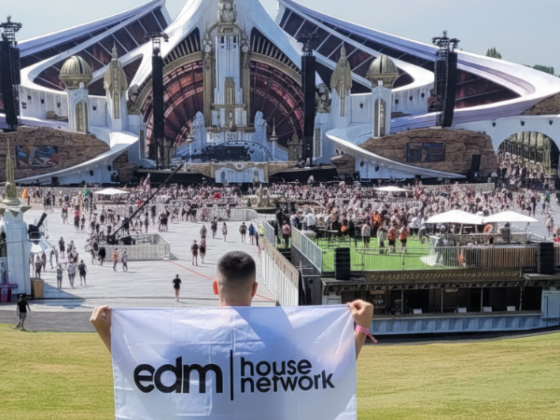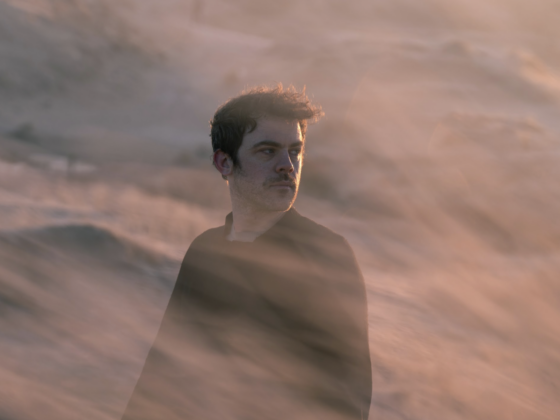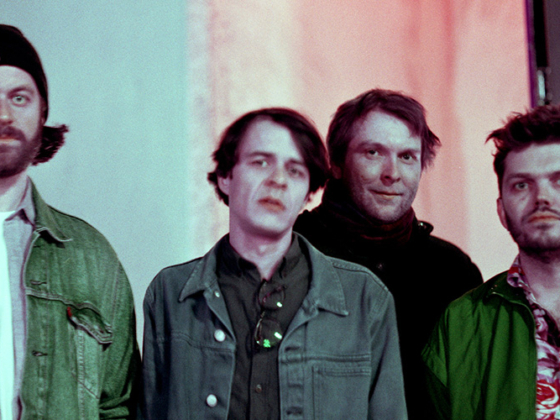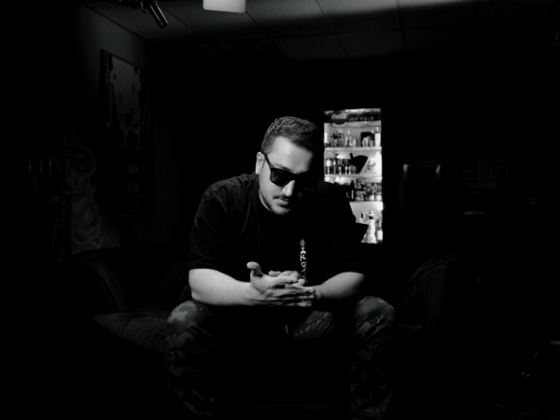It all started less than a year ago. Miles and miles away from where I'm sitting right now, back in September 9 and 10, 2011, a quite amazing event took place in the ancient city of Wroclaw, western Poland. It was amazing to me, at least; but if you're reading this, chances are that you think exactly the same – maybe even that I'm being subtle using such adjective in this case, and I wouldn't disagree with you. Enough, though. The event I'm referring to is the much-famed programme of two concerts that presented the unprecedented – both in the literally and awesomeness-levels sense – co-operation of Krzysztof Penderecki with Jonny Greenwood (of Radiohead) and Aphex Twin. (Fuck me, but I seriously believe this to be a cliched-case of no need for introductions.)
Both Mr. Greenwood and Aphex Twin are much-inspired-by fans of Penderecki brilliant opus, particularly his 1960 to mid-70's avant-garde years – which I also won't bother to extend myself upon, unless you expect me to write a thesis here. For the pleasure of our – myself included – short-attention-spam generation, I'll focus on two pieces composed by Penderecki back in his first years: "Threnody for the Victims of Hiroshima," from 1960, and "Polymorphia," from 1961, both beautiful groundbreaking works responsible for making Penderecki a name in the avant-garde classical music scenario – also for making me come close to breakdown in tears every time I listen to it. These two works form the basis and the reason for which this collaborative record between Greenwood and Penderecki exists.
While the Aphex Twin collaborative concert of September 10, which presented two new works – his remix of the "Threnody" and the mesmerizing "Polymorphia Reloaded" – remains to see the light of day in any form, for the profound sadness of many music fans, Greenwood's September 9 concert resulted in the making of a brilliant album. Simply titled Threnody for the Victims of Hiroshima / Popcorn Superhet Receiver / Polymorphia / 48 Responses to Polymorphia, this was released in March 12 on Nonesuch Records. Finally we're able to experience, in one record, both Penderecki's ever-powerful haunting pieces, in an impeccable performance by the AUKSO Orchestra (under the conduction of Penderecki himself), and Greenwood's inspired-by compositions "Popcorn Superhet Receiver", from 2005 (material from which was used on the There Will be Blood soundtrack), based on "Threnody" and "48 Responses to Polymorphia" – this one having world premiered on the 2011 concert. Both Greenwood pieces are also performed by the AUKSO ensemble, this time conducted by Marek Moś.
Now let me clarify something. It is a somewhat common "knowledge" that classical (or all) music is best appreciated when you have at least a small notion of musical theory – and that's not my case. By chance, as everything else, it happens that I never learned an instrument, but such is life; with time I discovered that music is an art I love, but not the one I want to work with: that would be cinema. And as a cinema lover, my approach to music has developed into a completely different way of appreciation from that which encompasses need for theoretical repertoire. Of course, there's no such thing as a wrong approach to the appreciation of music, so I'm not saying that the way I listen to music is better; I just expect that my opinion isn't less valid for my ignorance of certain structural aspects of music. Truth be told, a side of me would love to actually understand theoretically what is happening in the song, but sometimes I feel that'd reconfigure the song's strength to me in a way which I don't desire to experience.
Also obviously, different kinds of music might all be appreciated from completely different angles, for different reasons; variables are too many to try to even bring this close to a predictable understanding – but even though the trying itself might be an exercise in futility, its conclusions can be fruitful in unplanned ways, I shall say – but here's not the place for such a discussion. Anyway, I'm a fan of cinematic music. What makes a song cinematic, though, it's impossible to say – an aleatory conjunction of influences acting in a given moment, too specific to be relevant. However, like everyone else, I'm light-years from being unique, therefore what is cinematic to me, has a very good chance of being cinematic to you, even if for completely different reasons and in completely different ways. The cinematic-quality of the song itself is not measurable, but since artistic merits are passive of being objectivized, so is the imagery-evoking power of some songs in relation to others.
Therefore, while perfectly described by the first word of its title, "Threnody for the Victims of Hiroshima" could have been released as "untitled" (and indeed, it was originally named "8'37"" – possibly a nod to John Cage – a fairly uncompromising title) and I'm sure I'd be proven right when I say, without reluctance, that the visual associations provoked by the actual title are irrelevant to the song's imagetic strength – I'm not a native english-speaker, and I admit that I didn't remember (or never knew – I also don't remember) the word's meaning until after hearing the song for the first time and looking it up. That didn't prevent me from being completely devastated by the music; under the song's alternating physical and visual stimulation, the piece composed for 52 strings treated under the most unconventional scoring by the young Penderecki doesn't need you to understand its intricate composition to perceive its singularity. Overused as it is, the word "atmosphere" still is essential to describe what "Threnody" constructs and destroys, several times, during its 9'16" duration (in this recording). As a matter of fact, Penderecki's composition is much more aimed at textures, the melodic use of individual notes hardly being the center of attention. An imagetic connection with the listener is intrinsic to the song's existence.
Same goes for "Polymorphia" – an excellent title, describing perfectly, as said by Wolfram Schwinger, "the exchange and simultaneous penetration of sound and noise, the contrast and interflow of soft and hard sounds.” We're thrown into a surreal setting of non-musical sounds coupled with the most disturbing instrumentation to create an ever-present tension. The altercation between silent, soft, chaotic and explosive moments creates an structure where each is more menacing than the other in an never-ending cicle. A vortex of sound in which we're thrown that swirls with increasing intensity to the point that we're left incapable of moving, in fear, only to finally find it ending in the most unexpected heavenly-comforting tone. In that sense I could even argue that it can be an ode to life, which is unpredictable and meaningless in its randomness; therefore beautiful – but I digress. Every moment of this piece contains a whole world of music to be appreciated, a whole world of scenes to be projected in the mind, you shall (should) be the one to see them.
I'm not trying to review Krzysztof here though, since reviewing him is like reviewing Dostoyevsky, or Von Trier, or Orwell, or Kubrick… it's futile. A thesis consisting of a number of pages that tires me only to think of it might do the trick, but not a review. See this as more of a way of trying to convince you to listen to the album. Whether it is good or not is not in question here. Which leads me to say that when reviewing Jonny's music, in some ways I'll be fooling the reader, saying the reasons why his music is objectively good, when what matters is whether he or she will like it or not, but oh well, such are reviews. Mr. Greenwood's pieces form the centerpiece of the album since they never been released before. That may sound weird, given what's along it on the album, but I'll explain:
As expected, "Popcorn Superhet Receiver" and "48 Responses to Polymorphia" (which is the strongest of the two) drink with no reservations on its sources of inspiration. For that reason, many may argue it has little artistic value, or not – I don't know, and more precisely, I don't give a rat's ass. That's because Jonny, in his enourmous brilliance – more than proven after all these years with Radiohead and through his sadly-small solo discography -, invested his creativity in filtering Penderecki's compositions as a whole through his own artistic prism. This way managing to create an homage by retaining Penderecki's sense of construction, at the same time being original by reinventing his sound (not actualizing it, since that's not necessary, but presenting it in Jonny's own timeless vision – interesting to say, "48 Responses" starts where "Polymorphia" ends, serving as a statement that this is not derivative at all, in the derogatory sense) and beautifully maintaining the cinematic sense found in "Threnody" and "Polymorphia," but with a whole new imagery. This being what impresses the most and what captivates the listener who wisely looks at this through this angle – dispensing the historical factor.
For those who know Penderecki and his compositions, this will be a treat not only because of the beautiful AUKSO performances, but because Jonny has really done the impossible, which is to create something that can sit besides Krzysztof's masterpieces in an ahistorical setting, which is the intention. Hell, if the man himself thinks so, who am I, you or anyone to say otherwise? I like to think that Jonny did – in an infinitely superior way, of course – what I just did, but with music. That's why his compositions are so… intense, powerful. And for those unfamiliar with Penderecki, well, please be my guest to start here. Now. Stop reading. Go.
The horrifying and its derivations in music – which are ever-present in the album – might be experienced as beauty coming from the most divine imagery – and depending on the talent of its creator, even more efficient than it. That's very case of this record. So, as usual, you're left with my standard conclusion: go listen to it.
- Buy the album at Nonesuch Records site. (In FLAC or Mp3)
- Buy the album at Amazon. (In Mp3)
P.S. I still argue fiercely with those that like to make a quality-wise distinction between the chemical-influenced experiences brought by music and drugs, and I'm a enthusiast of both. They're all great in its own ways, and usually one can enhance the other. I believe this album demonstrates that I'm right.











